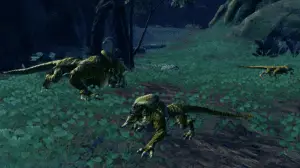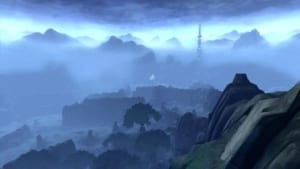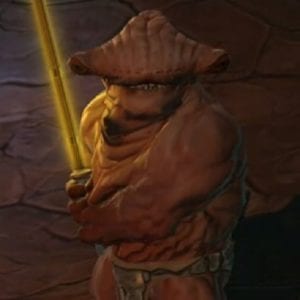Spoiler warning for all main character storylines in Star Wars: The Old Republic
At first I thought Star Wars: The Old Republic (SW: TOR), a Star Wars MMORPG about the times between Revan and Bane, was my problematic fave. Generally I liked it, though it certainly was problematic; what else is there?
The more I had thought, though, the more I understood that the more accurate term for my feelings would be ‘love-hate’. The ‘love’ part was for the beautiful scenery, immersion, general possibility of somehow taking part in my favorite universe’s history, certain storylines, some perfectly fleshed characters, and the wacky roleplay that is inevitable when you create a character in a MMORPG. (Ah, that guilty pleasure of roleplaying the Jedi Knight as an Imperial deep cover agent!) The ‘hate’ part was for recent DLCs’ railway plot, unfulfilled promises (‘your choices matter’, they said), other storylines, a few cardboard characters, retcon all over the place, blatant sexism, and even more blatant hypocrisy.
One essay is not enough, certainly, but I want to talk about the designated protagonist in SW: TOR.
It’s All About Love
It begins with visuals.
First and foremost, that game gives you Space, in all its magnificence. You really have the feel of being there when taking in the scenery from the orbital station or when piloting a starfighter: the starry sky, the black-and-purple infinity, shining suns, and gem-like planets. And when you descend to the ground, you see that every planet has its own unique face.

Ilum and Hoth are both cold and clad in snow, but they are still different. I liked the silver blossom in the black Ilum sky just as much as (well, probably) I liked the colossal lace-like ice peaks and vast snowy plains of Hoth. Coruscant and Nar Shaddaa are both ecumenopolises, planet-cities. They are inevitably alike, but one would never mistake the rusty dignity of the first for the neon insanity of the latter.
What’s more, the faces match the planets’ character. It’s not beauty for its own sake; it creates a ‘spirit’ for each planet. It aids immersion and offers food for thought. The only problem I had with the visuals were with the animals. They were deliberately ugly and distorted. I actually thought, ‘Crap, are there no nice fluffy things in the Galaxy?’. But that’s personal taste, and I think many would like the animals they provided.
But Then There Is a Problem
With the visuals comes the distinct message that you are in a black-and-white morality world.

Dromund Kaas is gloomy and depressing, Imperial Taris is dark green and gray instead of the expected bright green and gold of the Republic. It’s generally alright and in line with SW morality, until you look a bit deeper than the surface. Herein lies an abyss of hypocrisy, and Double Standards is the abyss’ name.
Before I dive into it, let me explain that the setting is the end of a cold war between the Empire and the Republic. The subsequent real war is interrupted by a common enemy who subdues both, only to be opposed by both, lead by the player character (PC). You can choose between eight classes. Four of them are Force-users (two Jedi, two Sith), two are free birds (a smuggler and a bounty hunter), and other two are soldiers (a black ops trooper and an intelligence agent). Every one of them can choose between Light (Paragon) or Dark (Renegade), a system that is twin to the ME one. Naturally, the Lightsider non-Sith Imperials are expected to defect to the ‘right side’. To stay loyal would be the bad answer, which would be understandable if it was defection from evil to the good. But… it just isn’t.
What Is A Designated Protagonist?
This term is often misappropriated, probably only a bit less often than Mary Sue is. The most common misconception is that if your protagonist is flawed, he doesn’t deserve to be one, so he is ‘designated’. That is certainly not the case. Neither does the case of a virtuous antagonist mean that character is ‘designated’. A ‘designated protagonist’ occurs when your ‘good’ guys and ‘bad’ guys behave exactly the same way, only the narrative demands that if the ‘good’ guy did it, it is ok. Or, when your ‘bad’ guys behave much better then your ‘good’ guys, but the narrative demands that they are still Evhul.
This is the case with, for example, racism in the Empire and the Republic.
Example 1: Good Guys Use Good Slurs!
When the Imperials use racist slurs against non-humans, it is bad. When the Republic characters use racist slurs against the Sith and dream of wiping the entire race out, it is good (unless you’re mad Revan; if you are mad Revan, it is bad). Did you notice that there is no concept of genocide in the Empire’s use of slurs? Get used to it. Then again, they are ok with making all non-humans and non-Sith their slaves, so maybe they’re about equal?
Or, take the Jedi. They call the Tythonian natives ‘fleshriders’, and that’s the only name under which we would know that poor people. Of course, in the Imperial-aligned oppression we are always given proper names for tribes and races. Their oppression is bad, after all. It’s completely unlike the Jedi’s.
Example 2: Good Guys Do ‘Good’ Genocide!

When the Hutts oppress Hutta’s natives, the Evocii, it is bad. When one Imperial guy organised an extermination camp for those natives, it is even worse. It’s so bad his own peers are disgusted with the idea! But when the Jedi drive Tython’s natives out of their ancestral lands… or when they kill them like animals… or deny them sentience on the grounds that they don’t speak Basic… well, it’s ok.
There are two instances when the PC can acknowledge that they are more than just mindless beasts. However, both are side-stories, not necessary to complete, and both are accessible for Knight only. The main storyline doesn’t notice them at all, and the deaths of the natives don’t matter. Oh, and the Jedi are so surprised one of the natives could say ‘Jedi’ and had a bit of Basic — geez, he should be sentient after all! Not that it stopped them from further exterminating the tribesmen.
Mantellian Savrips fare even worse. They are treated as meat to be killed by non-Force sensitive Republican PCs. One doesn’t have even an opportunity to say a word against genocide. The lore only says the Savrips are too aggressive to negotiate with and oppose settling on their lands for no good reason. Huh, I heard something like that once or twice. Like, those Australians, for example…
Example 3: Good Guys Kill For Good!
So, let’s go back to the Jedi Knight storyline for a while. After all, it’s the game’s main hero, despite it trying to pretend that all PC stories are equal. S/he is a chosen one destined to bring an end to the Evil Emperor. As their journey begins, s/he is sent to kill as many natives as possible because natives attack the Jedi training grounds. Of course, the natives are too dumb to attack on their own (that’s not my sarcasm, but rather official statement), they are led by the mysterious man, who pretends to be a Jedi. The Knight kills him and later is given a lecture about why killing is Very Dangerous for a Jedi.
Frustratingly, the game pretends there are no natives involved. Grandmaster Satele Shan talks about killing the mysterious man, not the natives. Just the probably-Sith. And her only caution? Well, try not to feel anything while you kill, PC. Any feeling is bad, even feeling sorry for killing someone. That’s the core of the Jedi teachings for you! And that precious idea fits well in the narrative, where our Main Hero is almost never given an opportunity to resolve a situation peacefully.
Off-topic, or Is Genre An Excuse?
One could say ”It’s a videogame, violence is a necessity!”. Well, you may be right. But there’s one problem with that logic. While the Jedi PCs kill and slaughter, the Imperial PCs, Sith especially, are almost always given a chance to talk things over. In fact, they can often resolve the situation without unnecessary deaths. What’s more, even a game situation where your PC is sent to kill the natives can be resolved differently.
As the racism is only acknowledged when it is ‘bad’ racism, let’s take a look at the Bounty Hunter prologue. Here, our PC must complete three vile tasks for an evil crime lord. Twice he can guile and let his targets live (and the third kill is in self-defense anyway). My main interest is the first task, where our PC is sent to bring the head of a native resistance hero.
The narrative carefully informs the player about the whole situation through lore objects and game dialogues.
First, the crime lord Neemro the Hutt expresses his displeasure about raids on his property. Then comes the information about the Evocii. We find out that the Evocii were native to Hutta, that the Hutts made them their slaves, and that a tiny portion of brave people fight oppression with terrorism. Then, the PC goes to talk with the rebels. S/he can (if s/he chooses Light Side option) save their hero. Despite that, the rebels’ spiritual leader tells the PC that they are unwelcome in their lands because s/he killed some Evocii on her/his way there.
Everything is more than clear both for the PC and for the player. We sympathize with the Evocii, not with the Hutts. What’s more, the narrative itself sympathizes with the Evocii. Strikingly, they are in the same situation as the Tythonian natives, only that the Jedi are not Hutts, the latter of whom are Evhul.
Example 4: Good Guys Create Good WMDs!
WMD means ‘weapon of mass destruction’, a weapon specifically designed so to kill many people at once, regardless of whether they are civilian or military. The Death Star was the most famous Star Wars WMD. It was Imperial. In this game, the only side that constructs WMDs is The Republic. Ok, one of their chief constructors was a Sith in disguise, but none the less. They paid for it.
For the record, the only Imperial superweapon we see is in the Inquisitor storyline. It is a cannon that can wipe away whole star fleets. And it’s not at all like the thing that damages a planetary core, or the thing that can set whole atmospheres on fire, or the thing that kills tagged persons with a precise orbital strike. Because those things are designed either to kill all — not merely the enemy military — or specifically to kill the civilians.
Moreover, the Republic’s general is completely unapologetic about those projects. Our PC has to destroy them, yes, but only because a rogue Sith is hunting the WMDs to use them against the Republic. Otherwise, they would be ok to use. Because it’s against the Evhul Empire, yay!
Example 5: Good Guys Spread Good Plague!
Following the above mentioned logic of ‘it is against the Evhul Empire so it’s fine’, a very good person would probably try to capture a rakghoul-controlling device and a shadow arsenal, i.e., a superstash of supermissiles. The second is nearer the WMD issue. The first, though.
You see, the rakghouls are, well, ancient Sith-created zombie ghouls. They are highly virulent, like your typical zombies, but if they eat enough human flesh they become able to use the Force and speak and behave almost like a sentient being. Only with a craving for human flesh. These rakghouls are called nekghouls. They inhabit Taris, a contested Imperial/Republican planet.
There are two issues with this storyline. First, the Jedi are so inclusive and tolerant that they teach the nekghouls the Force. I mean, only the light side of it of course. That special Light Side that is about killing Imperials without emotion. And no, that Jedi was not a fallen one. I’m not even a bit sarcastic; they teach the nekghouls to use the Light Side to kill the Imperials. So…
Second, the very good guy tries to obtain a device that would control all the Tarisian rakghouls at once. Not to destroy them. To use them. And that guy is so good, his actions should prompt our other PC, the Imperial Agent, to defect. Yes, the Agent should see that it is only natural to want to unleash a plague on his fellow citizens! Because the good guy does it!
Designated Protagonist in SW: TOR
These are only a fraction of the problems with the ‘good’ side. I didn’t tackle use of mind control, or lack of responsibility (when a person who killed hundreds is given a pat on the back; s/he fell, but is redeemed now). Or how the fate of whole refugee communities is given to a young padawan, or the support of local extremists…
So, who is the designated protagonist? Not the Jedi Knight, though s/he has her/his own problems. Nor even the Jedi Order, though it bothers me how evil it is. The protagonist is the Republic itself.
Every one should want to get there, but they have no real, in universe reason why.
A Lightsider Agent who is a good patriot should align with a man who dreamed of the mass-destruction of Imperial planets? A man who planned to use a zombie-like plague against Tarisian Imperials?
A Lightsider Bounty Hunter, a person of their word, should betray their contract for a corrupt politician? A man who, just to do a favor for his Jedi friend, framed an honest person as a terrorist, child murderer, and everything else one could imagine?
They give us no reason to like the Republic. They give us plenty of reasons not to. Yet, if you want to do the ‘right thing’, you should defect to the Republic. Because it is against the Evhul Empire and seriously intends to wipe out all that Imperial scum. Which is a good thing to do, isn’t it? Isn’t it???

